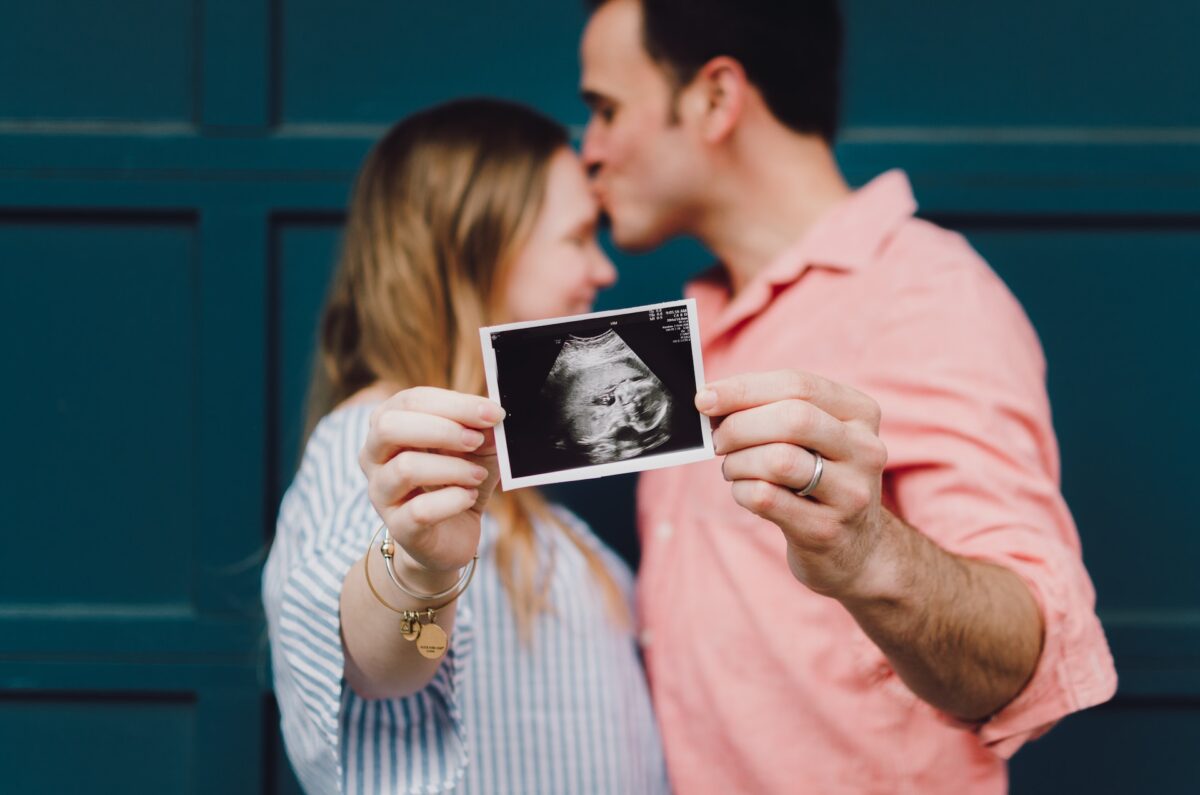For most, when a woman falls pregnant, it is an occasion worthy of a celebration for the nine months of gestation which she is going to experience. This physical and emotional change may prove to be challenging, and she will need as much support as possible, especially from her partner, the father of the baby.
This support usually comes in the form of emotional commitment and everyday involvement, and perhaps also by way of an announcement of “We are pregnant”.
Ah, those dastardly pronouns strike again
The phrase “We are pregnant” coming from a heterosexual couple has been floating around for more than a decade. The mother-to-be or the father-to-be, or both together, use this phrase.
This preference for the plural pronoun ‘we’ over the singular pronoun ‘I’ is mostly for the inclusivity and involvement of the male partner. Some women prefer to say “We are pregnant”, referring to her and her partner having a baby together. Likewise for the man, instead of saying “Lynette is pregnant” or “My wife is pregnant”, he would say “We are pregnant” to indicate that he will be involved and is essentially a part of the pregnancy that his partner is going through.
‘We’ are pregnant – yes or no?
The Cambridge Dictionary defines pregnant as (a woman and some female animals) having a baby or babies developing inside the womb.
So is it logical for a couple to announce that ‘they’ are pregnant, when only the woman is physically pregnant?
Biologically, no. The man is anatomically incapable of being pregnant.
Grammatically, no. A plural pronoun should not be used because only one person is pregnant.
Sociologically, yes. It is a way of including the man in the experience and emphasizing his present and future involvement in the child’s life.
The phrase “We are pregnant” is often used by couples as a way to express that they are both expecting a child, and to acknowledge the supportive role of the male partner throughout the pregnancy and childbirth process.
While the phrase may not be technically accurate, it is a way of expressing the couple’s shared experience and responsibility in their journey of parenthood.
‘We’ over ‘I’
The use of the pronoun ‘we’ indicates the recognition of shared parental responsibilities from the conception stage onwards, and that is a cause for celebration. For young couples, they find the phrase “We are pregnant” more meaningful and it defines the depth of their relationship as they prepare to do everything together, including the husband reading every book about pregnancy, and adapting his lifestyle to follow a similar one to his pregnant partner’s.
The phrase seems to sound edgy, progressive, even liberating. Afterall, if Family Guy uses the phrase, it has to be hip, as the American animated show is deemed to be fairly progressive with their jokes and satire as the episodes often reflect their keeping up-to-date with current affairs and trends.
“Brian: What have you done?
Family Guy Season 13 Episode 12: Stewie is enceinte
Stewie: I think you mean, what have WE done? Brian, we’re pregnant.”
In extreme cases, the phrase also saves the male partner from asking “Are you pregnant with my child?” This is perhaps to reassure him that he is after all the father. “We are pregnant” equates to “I am pregnant with your child, not anyone else’s child. And now, display your paternal responsibilities.”
Transgender couples and “We are pregnant”
Indeed, for cisgender couples, the phrase “We are pregnant” is akin to “I am biologically pregnant and my (male) partner is psychologically pregnant.” However, going a step further, if a transgender couple involving two biological females uses this phrase, it may be confusing as to who is physically pregnant, or if any of them is pregnant at all. Surrogacy could be involved here, and it is a tricky territory to tread on. Or it could be that both of them are pregnant, in which case they are staying true to the phrase used.
For a transgender couple involving two biological males who use this phrase, it is equally confusing. Who then, is actually carrying the baby? Surrogacy is likely involved here.
For a couple involving a trans man or a trans woman, pregnancy is only possible for transgender men who retain functioning ovaries and a uterus, such as in the case of Thomas Beatie (assigned female at birth) who successfully gave birth in 2008 at the age of 34.
For transgender women, it is a complicated process that involves a uterus transplant. Lili Elbe (assigned male at birth), made famous by the movie The Danish Girl (2015), underwent a uterus transplant in 1931 in an attempt to achieve pregnancy, but later died of complications following the procedure at the age of 48.
When a couple involving a trans person uses the phrase “We are pregnant”, it can be confusing and more questions may be asked, which may lead to some socially awkward situations.
Inclusivity gone a tad far?
The phrase “We are pregnant” may be a modern-age attempt at unifying a couple and maintaining gender equality. However, it is scientifically incorrect as cisgender men simply cannot have babies. When Rosie broke the news “We’re pregnant” to her husband Don in The Rosie Effect (2014), the protagonist thought that the term was logic-defying and contradicted basic biology.
Image by: Loren Leong
Some may argue the man provides the sperm after some 30 seconds of hard work so they deserve to be included. Indeed, men should be given due credit for procreation. And their chance for involvement will come when the baby is born. But reading every book about pregnancy does not quite qualify them to be pregnant like their partner.
Pregnancy is a unique experience for women who are on their journey to motherhood. Can men really understand the complexities of pregnancy? By saying “We are pregnant”, the man will not help his partner share the burden physically. The woman has to go through the process by herself – getting morning sickness, gaining weight, going through hormonal changes, experiencing physical changes, having to worry about the health of the fetus growing in her womb, and ultimately enduring the pain of childbirth.
‘We’ are or ‘She’ is giving birth
During labor and delivery of the baby, while her partner watches on and waits, should the couple also say “We are in labor” or “We are giving birth” in the name of inclusivity and gender equality? A pregnant Mila Kunis presented a monologue on Jimmy Kimmel Live! on how men should not use the phrase “We are pregnant” unless they can “squeeze a watermelon-sized person through their lady hole”.
To Mila, the phrase does not only sound awkward, but confusing too. Perhaps, that is the whole purpose of the couple who uses it – to confuse their friends with a seemingly attention-seeking phrase that fishes for questions, and then presumably get a kick out of explaining their grand plans of going through the pregnancy together and declaring both their commitment to the whole process.
Is it necessary for the couple to ostentatiously show the involvement of the baby’s father by means of a pronoun? Does that make a difference in the couple’s relationship and commitment to each other?
Call a spade a spade – Calling out the uterus-free ‘not-pregnant pregnant guy’
Writer Tracy Moore from Jezebel.com shares Mila’s views and responded to an opinion piece by Aaron Gouveia on Time.com: “Support is great, but let’s not mince undercooked meat here. Saying “we’re pregnant” overshadows that there is a person doing life-threatening, body-changing work right beside you.”
Alternative phrases for “We are pregnant”
There are other phrases that can be said as a couple. Here are some common (and simple) ones that mean the man and the woman share the responsibility which indeed is necessary for pregnancy to occur. There is no ambiguity and they convey the same message without inviting ire from anyone.
- We are expecting a baby.
- We are going to have a baby.
- We are going to be parents.
- We are welcoming a new addition to our family.
- We are eating for three. (The woman usually says: “I’m eating for two.”
- There’s a bun in the oven.
- (When announcing to the parents of the couple): “You are going to be grandparents.”
Ultimately, it is a personal choice about which wording to use. It is certainly alright for the couple to say “We are pregnant” as it acknowledges the shared responsibility and experience of the pregnancy, and that is definitely a cause for celebration. However, it is also important to respect individual preferences and the way that each person chooses to talk about their pregnancy. We should also be mindful while trying to be respectful and inclusive, that we do not undermine the value of the core subject, that is, the process of the pregnancy.
Cover image by Kelly Sikkema on Unsplash
Reviewed by Sarah Guvi and proofread by Cosima Rudigier





